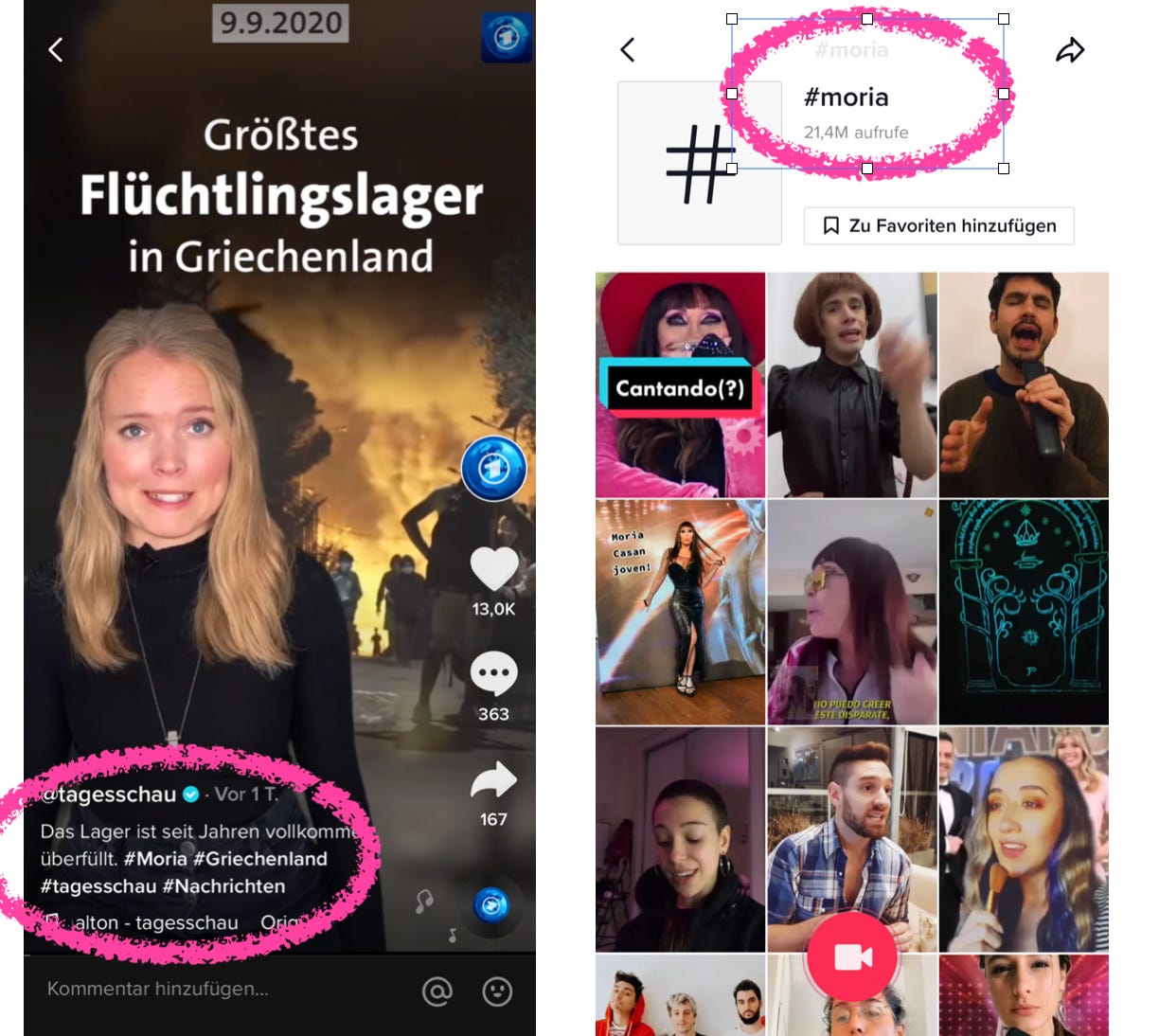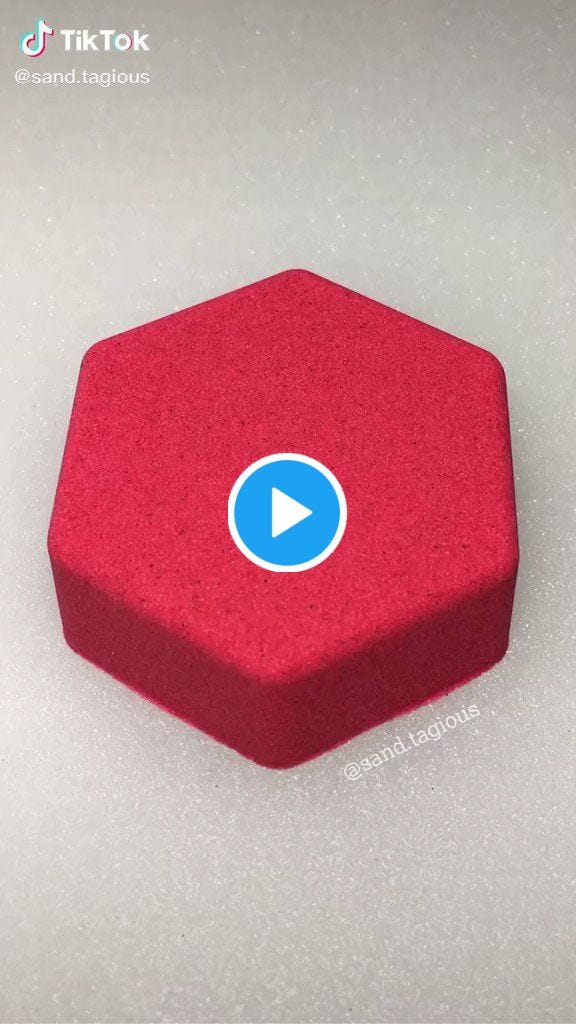Hello.
Ian Bogost is an American academic, a video game designer and a contributing writer at The Atlantic. He wrote about TikTok a month ago: “I wrote about why TikTok is great but also bad.” The article still holds true. Here is a quote:
TikTok might be pleasant, or joyful, or even subversive. But it is also an app on your phone, on the internet, connected to data centers and driving both corporate amalgamation and transnational entrenchment. It’s a bummer, but nothing is ever just an app anymore. Maybe Microsoft will save TikTok, or maybe not. Either way, there aren’t better and worse options here, so much as worse and even worse ones.
Today we talk about
🧯Moria & Shadow Banning
🦅A new critical Tik Tok report – funded by the State Departement
🔮TikTok & the future
- - -
🧯Moria & Shadow Banning
Europe’s largest refugee camp, on the Greek island of Lesbos (New York Times, September 9) near the village Moria has been destroyed by various fires, leaving 13,000 people without shelter (BBC, September 9). While my timeline on Twitter was flooded by tweets with the hashtag #Moria i could not find a single (!) video on TikTok about the catastrophe. Just random spanish videos. Moria obviously means “I died” in spanish.

I then checked the TikTok account of Tagesschau a German national and international television news service produced by the editorial staff of ARD-aktuell on behalf of the German public-service television network ARD. Tagesschau has a TikTok account with 640,3K followers. That are more followers than the WashingtonPost has (641,2K). Strange that the Tagesschau TikTok about the situation in the camp including the hashtag #Moria was not shown on the #Moria-hashtag site at all. I scrolled a lot. Only after actively watching the Tagesschau TikTok, did it suddenly appear on the list.
The humanitarian catastrophe in the bleak tent camp designed for 3,000 people that at times has swollen to more than 20,000 was not visible on TikTok at all. At least not for me.
TikTok is not the first or the only service using so called shadow-banning – making a user's contributions invisible or less prominent to other members of the service – but it is weird if you find out that content (your own or other) is hidden by an invisible algorithm.


In a very long and winding text Rob Horning cites Ben Thompson “TikTok’s algorithm, unmoored from the constraints of your social network or professional content creators, is free to promote whatever videos it likes, without anyone knowing the difference”. Horning puts that in perspective by adding: Never mind that the same could be said about any platform whose content is sorted by black-boxed algorithms. (And never mind that television networks are free to show you whatever ads they want while you are trying to watch some other content.) 🤷
🦅 The ASPI report – funded by the US State Departement
TikTok has a tradition of banning different kinds of topics, including LGBT content including same-sex couples holding hands, including in countries where homosexuality has never been illegal (Guardian, September 26, 2019) (BBC, February 12, 2020).
A new report released by the Australian Strategic Policy Institute (ASPI) has found out that the app is now shadow banning hashtags, including the word “gay” in languages including Russian (гей), Arabic (الجنس_مثلي), and Bosnian (gej), reports Quartz (September 8).


A tiny little detail can be found on the website of the report. It says: “Funding for this report was provided by the US State Department”. Just to keep in mind: On 7 July 2020, U.S. Secretary of State Mike Pompeo announced that the government was considering banning TikTok.
Without wanting to discredit the findings. It is interesting to see that the results of the report please the doner. We should keep in mind that we are in the midst of an information-nationalist warfare as Sarah Jeong argues (The Verge, August 7): “The banning of apps, the passage of new digital surveillance laws, the regulation of speech on platforms, the government sponsorship (implicit or explicit) of new technologies — these are the battles that make up information-nationalist warfare.”
🔮TikTok & the future
So what happens when TikTok is sold, is not sold, is banned, is not banned. The future seems not so very wide open. And the cultural pessimist are being pessimistic. Here are some unsorted thoughts:
Look to India. The indian government banned TikTok and other Chinese apps following clashes at the India-China border in the Himalayas. India was TikToks biggest overseas market with probably 200 million users (Techcrunch, June 30).
It’s not an overstatement to say this has been a tragedy for Indian users (Slate, August 7). What are they doing: Many are not happy about it, but they’re adjusting. What else can you do as a normal user. After all it is just an app. Is it not? Interesting to see that the business news in India mirror the US: Why TikTok sale may run into hurdles (India TV News, September 7). I mentally underlined this sentence: The valuation and interest in its assets {TikTok} may diminish if the ban continues.
Tumblr, Instagram, Oculus or any other big us-tech acquisition. Did it work out? Well. You can not generalize. But as long as we are discussing a capitalist acquisition in a capitalistic system there have to be clear monetizable benefits that would probably destroy the user experience and the general mood concerning the app at some point. In a not so far future.
Momentum. Has TikTok the potential for becoming something like a new Facebook? A more or less steady place (with a lot of problems) but somewhat stable? I do not think so. It is a volatile conglomerate right now. TikTok is only 2 years old. Phenomenons like alt, deep, dark, whatever TikTok are only a couple of months old. The combination of multi-clip high density, great and easy ux, shareability and endless creativity are fleeting. Will they survive at Walmart? I doubt it.
Or maybe… TikTok is not sold in the US in the coming weeks. Biden becomes president. He has more urgent things on the list. TikTok matures. And due to pressure from activists and media TikTok adjusts algorithmic decisions. The app is not perfect. But plays a crucial role in the daily news routine. Late and very late adopters follow. The kids are somewhere else…
Sorry. That was a lot of text. Here is some #ASMR for you.
Thx for reading. Please share. Please care. Marcus 🍋





